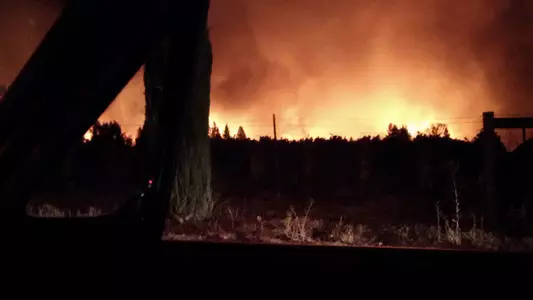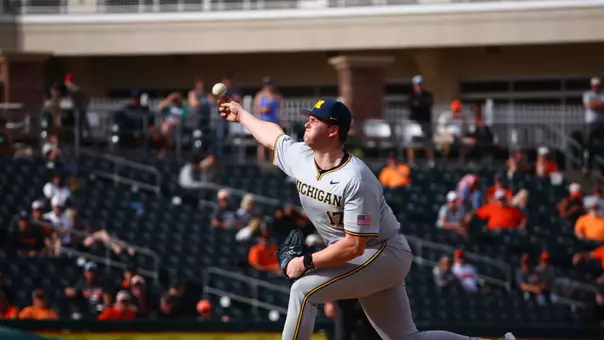
After the Smoke Has Lifted: A California Fire & Alec Rennard's Story
7/12/2018 2:09:00 PM | Baseball, Features
By Steve Kornacki
NOTE: This feature originally appeared in the spring issue of M Magazine.
Alec Rennard grew up in Santa Rosa, California, amid the rolling hills and "absolutely gorgeous" vistas of the wine country located a one hour's drive north over the Golden Gate Bridge from San Francisco.
The Michigan baseball pitcher loved soaking in the beauty of his hometown, which was changed forever by the fiery blazes that began Oct. 8 at the intersection of Tubbs Lane and Highway 128 in nearby Calistoga, and became known as the Tubbs Fire. According to a Los Angeles Times report, it burned a swath of destruction that was responsible for 22 deaths and turned 36,807 acres into charred hillsides dotted with burned-out buildings.
Chimneys stood as the only memories of what was once the Fountaingrove subdivision Rennard drove through daily while attending middle school and high school, and the historic red Round Barn at its gateway is gone. The Coffey Park area, where many friends lived, also lost the majority of its single-family homes.
"I don't even recognize where I live anymore," said Rennard, who one day after learning of the devastation incurred, was back home and volunteered to help at the Red Cross aid post along with his brothers, Noah, Austin and Colin. Their help wasn't needed, though, as so many others had signed up.
"You think you know where you're at, and I recognized the street names, but I didn't know where I was at. The sightlines were all gone and everything seemed so foreign. We'd lost so much. If you look to the east, nothing's the same. You never think something like that is going to happen to you."
Even some six months later, while recalling those events in the Wolverine dugout at Fisher Stadium after a game, the terror he sensed on Oct. 9 came through quite clearly.
"I went to bed Sunday and it really hadn't happened yet," Rennard said. "So, I went to bed thinking everything was fine. I called my parents because we usually call on Sundays, and everything was fine. But I woke up Monday to texts from 30 people, saying, 'Hey, are you OK? Is your family OK?'
"I got a sinking feeling. Something's not right. So, I listened to my voicemails. My parents said, 'Hey, there's a fire. We had to evacuate from our house. We don't know if the house is still there, but we're all safe. We had to leave everything.' Obviously, that was really tough."
His parents, Lori and Bob, and three brothers were out of harm's way, but too far away, some 2,300 miles between them.
"So, all Monday, I was a wreck," said Rennard. "I couldn't think straight. I was just thinking about home. I don't think I took a single note in any of my lectures in neurobiology (he's a biomolecular sciences major), anthropology and English. I couldn't focus, couldn't zone in.
"I was just so worried about my family. So, I went into Coach (Erik) Bakich's office. I was like, 'There was a fire. This is all I know.' It was really stressful for me, and he could tell that I was a mess. I can't say enough for what he did for me. He said, 'Whatever it takes, we're sending you home.' He got me on a flight the next morning (Tuesday) and I was home.


The Wolverines were conducting offseason practices and conditioning, and a team trip to the Dominican Republic was days away. But returning to Santa Rosa was Priority One.
"I was glad we were able to do that," said Bakich. "Being at a school like Michigan, we're able to do that."
Alec's aunt, Cheryl Davison, who also had evacuated her home and was staying in the South Bay area with her parents, picked him up at the airport and they drove to Santa Rosa, where Aunt Cheryl's house had been spared.
Rennard recalled reaching Sonoma County, where Santa Rosa is located: "There was a lot of smoke in the air. I had this dreadful, sinking feeling. It was daylight, but it looked like dusk. I still didn't know if our house was OK.
"I'd moved into that house in 2000, and so there were 18 years of memories there and everything I collected from my childhood. And it all could've been gone. Thank God that it wasn't. But I knew so many who lost it all. That breaks my heart. You take a step back from something like that, and it brings you all closer together."
His parents, who attended a mid-April series with Maryland, recalled the powerful and dry Santa Ana winds that caused the runaway fire to move so swiftly. No matter how his mother attempted to rake the leaves that Sunday, nothing worked.
"The wind was swirling," said his mother, Lori. "And they said we were getting at least 70 mph winds (hurricanes begin at 74 mph). The wind was so bad that night that softball-sized embers were flying. That's how things caught fire. But what woke us up Sunday night was the power going out."
They weren't alarmed initially, but then they went out to their pool and saw the glowing orange fires approaching their area from over two different ridges. They woke up their sons, telling them to pack for a week and to take anything they cherished, and evacuated.
His father, Bob, said, "The fire was moving 100 yards every three seconds."
Alec added, "There was no containment because of how fast and hot the fire went. There was an orchard close to our house, and if any of that had caught on fire, it was going to launch debris in our yard and possibly catch our house on fire."
His father is "100 percent convinced" that "if not for the vineyards surrounding" their country house while also protecting it, their house would've been lost. It also was not part of a subdivision, where one house would serve to torch the next house in a horrifying sequence of events.
They took computers, back-up drives storing financial information and photos, passports and birth certificates before leaving. But as of late Tuesday afternoon, still had no news on their house. Alec and his aunt found the road leading to the Rennard house blocked, and so they asked police officers if they could pass and were allowed entry.
"The house was still there," said Rennard, the relief in his voice still so clear.
He stared across the baseball diamond wearing a Michigan windbreaker on a chilly evening, and continued.


"We got into the house and there was no damage, just burnt debris from newspapers and magazines in the yard. Coffey Park, about a half mile away, burned to the ground. So many people that I was really close to lost everything. They were friends, people we met through baseball, in a close-knit community."
Alec said "no direct family" lost their house, but he noted that Maria Carrillo High teammate Andrew Vaughn, a slugging first baseman who is one of the Pac-12's top players at Cal-Berkeley, had his grandparents lose their house. Alec's good friend, Landon Passmore, and his 14-year-old yellow lab, lost their house and spent the next three months with the Rennards.
Alec spent three nights with his family, and all of them stayed with his parents' friends, who had plenty of room and welcomed the six of them. He made the trip to the Dominican Republic after all, assured that all was well back home. His parents and brothers were able to return to their ranch-style house once electrical power was restored.
"When we evacuated," said Bob, "we didn't think we were coming back to our home."
Lori said, "It was surreal for Alec. Everything and everybody he knew was in peril, and it felt like he was a million miles away. We were very lucky. What happened was shocking. It's still shocking, the level of devastation."
Bob added, "It just takes your breath away."
Lori is a clinical lab scientist for the Kaiser Permanente medical center in Santa Rosa, and said it was more than two weeks before it reopened. He owns a cellphone testing business.
Lori said having Alec home with everyone else was "huge" and said she sent Bakich a text in gratitude.
A half-year later, things are beginning to return to normal.
Rennard, a senior who transferred in last season from Santa Rosa Junior College, experienced tightness in his right pitching elbow after three starts this season. It took six weeks before he was cleared to pitch again in mid-April, but he hopes to be primed for the season's stretch run. Wolverine pitching coach Chris Fetter described Rennard as "an extreme competitor," and last year he posted a 6-2 record with excellent ratios of 15 walks to 65 strikeouts in 65 innings pitched.
Getting his hometown back in complete working order is going to take a lot more time, but resiliency is part of its heritage.
The San Francisco Earthquake of 1906 also destroyed downtown Santa Rosa, but it was rebuilt into a thriving town center featuring art deco and classic architecture. Now, the areas north of downtown are in need of massive reconstruction efforts. Restaurants and stores were destroyed along with all of those homes.
"Rebuilding is a continuous process," said Alec, "but it's never going to be the same. People's lives are never going to be the same. But I'm really proud of how our community came together and showed how strong we were.
"That was tremendous."











